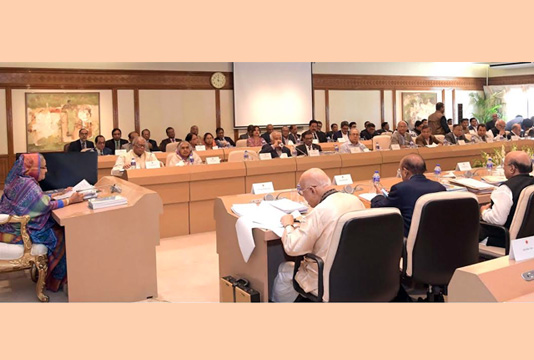Cabinet Okays EPZ labour law

The incumbent cabinet today held its last weekly meeting with Prime Minister Sheikh Hasina in the chair, approving a draft law allowing trade union activities in Export Processing Zones (EPZs) units.
“The law has been framed in consistence with the newly enacted Bangladesh Labour Law,” cabinet secretary Md. Shafiul Alam said while briefing reporters at Bangladesh Secretariat after the 202nd cabinet meeting of the current government at Bangladesh Secretariat.
He said the draft would now directly sent to President Abdul Hamid for its promulgation as an ordinance, which subsequently was expected to be enacted as EPZ Labour Act 2018 with endorsement of the next parliament.
Alam said the proposed law requires labourer organizations to have two-thirds support to enforce a work stoppage line with the provisions of the new Labour Law, which previously demanded three fourths of workers support for such actions.
Alam said the law would equip EPZ workers with rights to enforce work stoppage and factory lock-out while it also accommodated some ILO recommendations and some observations of Canada and the United States to make it more labour friendly. He said the existing regulations so far required an EPZ labourer organization to have at least 30 percent of workers to be its member while the proposed law set the threshold to be 20 percent to make the units more favourable for workers.
The labourer organizations, he said, could frame their constitutions as Sramik Kalyan Samity keeping it consistent to the Bangladesh Labour Law.
The cabinet secretary said if a worker wants to resign on completion of 25 of years service, he would get service benefit of 45 days for every working year instead of existing provision of 30 days.
The proposed law, he said, authorized Department of Inspection for Factories and Establishments to inspect the EPZ factories alongside the BEPZA authority.
The law proposed formation of Sramik Kalyan Samity Federation and deleted the provision of referendum before formation of a labour organization and bar on formation of a labour organization within three months of a newly established industry.
The cabinet in another decision has constituted a five-member cabinet committee headed by the Cultural Affairs Minister for reviewing the report of the Ninth Wage Board submitted to the government proposing new structure for salary and other benefits for journalists and employees working in newspapers and news agencies.
Ministers for industries, home, information and labour are members of the committee while the information ministry would provide secretariat support in this regard, the cabinet secretary said.
“The committee has been asked to submit report immediately as there is an obligation to publish the gazette of the award by January 28, 2019, the cabinet secretary said adding that the ninth wage board award for journalists would be declared after review of the cabinet committee.
Today’s cabinet meeting also approved the drafts of the Bima Corporation Act, 2018, the Bangabandhu Sheikh Mujibur Rahman Aviation and Aerospace University Act, 2018, the International Mother Language Institute (amendment) Act, 2018 and the draft for amendment to the Chittagong Hill Tracts (Land Acquisition) Regulation, 1958.
The Bima Corporation Act, 2018 would replace the previous act framed in 1973. The new law proposed for elevating amount of the authorized and paid up capital of both Jiban Bima Corporation and Sadharan Bima Corporation.
Under the new law the authorized capital of the Jiban Bima Corporation would be Taka Taka 300 crore and paid up capital Taka 30 crore. Authorized capital for Sadharan Bima would be Taka 500 crore and paid up capital Taka 125 crore.
At the time of inception, authorized capital of the each of the state-run insurance corporations was Taka 20 crore.
According to the new law the Board of Directors the corporations would have ten members representing experts of different professions instead of existing seven.
The International Mother Language Institute (Amendment) Act, 2018 would redesign the organogram of the institute through appointing a ‘Director’ as its chief instead of a ‘Director General’.
As a B-category organization of UNESCO headed by a Director General the chief of the Mother Language Institute cannot hold a position with the same name, requiring amendment to the institute’s law.
According to the amendment, the Mother Language Institute will be headed by a Director instead of a ‘Director General’ and its additional director generals would hold the positions of ‘additional directors’.
Under the new law the institute would have a six-member managing committee instead of existing 22 members according to the UNESCO rules.
Following the amendment to the Chittagong Hill Tracts (Land Acquisition) Regulation, 1958, the CHT people would get 200 percent compensation for acquisition of their land for government purpose and 300 percent compensation for acquisition of land for any private purpose.
At the beginning of the meeting, the Cabinet congratulated Bangladesh National Cricket Team for their test match victory against visiting West Indies.
The cabinet also expressed profound condolence at the death of Taramon Bibi, country’s lone gallantry award ‘Bir Pratik’ recipient female freedom fighter.
Information Minister Hasanul Huq Inu handed over the copy of a compilation of the speeches delivered by Prime Minister Sheikh Hasina in different sessions of the 10th parliament, the cabinet secretary said.
